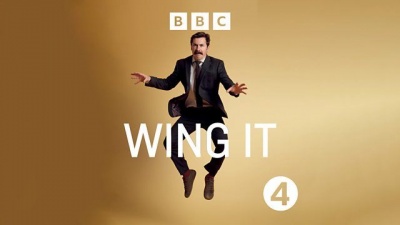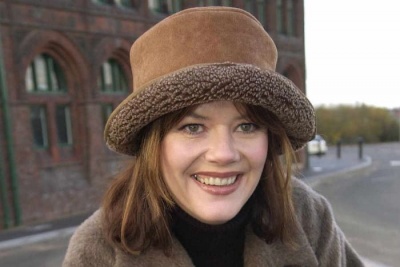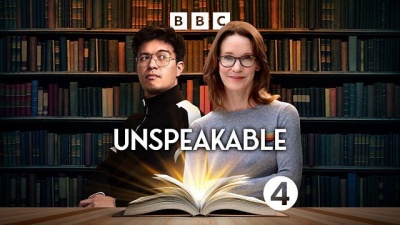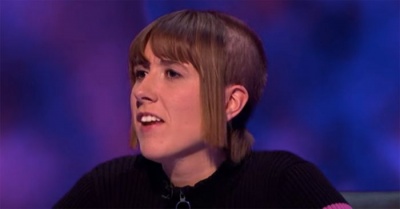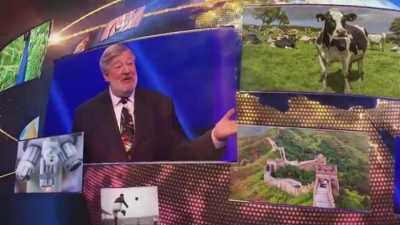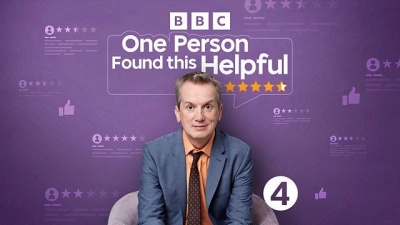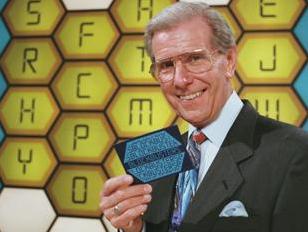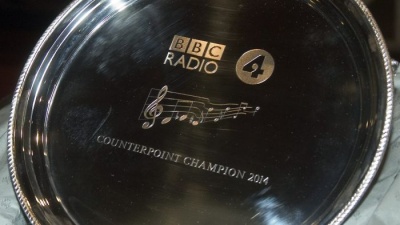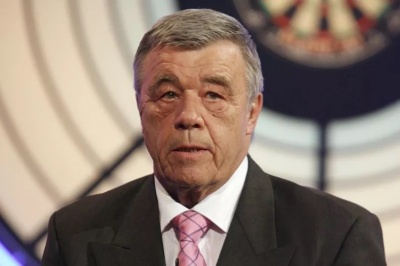Weaver's Week 2024-03-10
(Created page with 'Last week | Weaver's Week Index | Next week We've got (count 'em) four radio programmes under discuss…') |
(→One Person Found This Helpful: Sarah -> Sara) |
||
| Line 108: | Line 108: | ||
</div> | </div> | ||
| - | Our sample episode features Laura Smith and [[Marcus Brigstocke]], | + | Our sample episode features Laura Smith and [[Marcus Brigstocke]], Sara Barron and Pierre Novelli. And we begin by asking the panel: what's the best (or worst) review you've ever had. Pierre recalls being hired to do a private gig for all of the best bus drivers in Wiltshire, which is an idea so bizarre it would be his ''Only Connect'' introduction fact. |
| - | '''What did I buy?''' is the first round. Two reviews for each team, which hopefully will clue in to what they're describing. Marcus wonders if it's a Depilatory Wax – three more from their session later on the John Peel show. | + | '''What did I buy?''' is the first round. Two reviews for each team, which hopefully will clue in to what they're describing. Marcus wonders if it's a Depilatory Wax – three more from their session later on the John Peel show. Sara and Pierre take forever to come up with the idea of a lava lamp. "Well, that was stressful," says Frank. One way to put it, "painful" another. |
'''The reviewee bites back''': what happens when the business you're reviewing has a go in response. We hear a real review, then the teams snipe back at the person who left it. Frank gives the actual reply, which may or may not be funnier than the comedians' efforts. | '''The reviewee bites back''': what happens when the business you're reviewing has a go in response. We hear a real review, then the teams snipe back at the person who left it. Frank gives the actual reply, which may or may not be funnier than the comedians' efforts. | ||
Current revision as of 12:17, 10 March 2024
Last week | Weaver's Week Index | Next week
We've got (count 'em) four radio programmes under discussion this week. Radio 4 had a "season" of new comedy formats earlier in the year. A few of them were panel shows, enough to pass as a game show. We'll also listen to the grand final of music quiz Counterpoint.
Contents |
Wing It
BBC Studios for Radio 4, 28 January
Mike Wozniak hosts an improv comedy show, where preparation is completely useless. The panel: Josie Lawrence, Steen Raskopoulos, Cariad Lloyd, and Thomas Mayo.
Within 40 seconds of the show starting, we're into the first game. "Love Letters" asks the teams (lads versus lassies) to compose a letter to each other, in this case the lad is confessing infidelity.
Where's the improvisation in this? Ah, the letters are being composed one word at a time: Steen says one word, then Thomas builds on it. Where's the comedy? Discomfort: comedians flailing around for a sensible continuation to the letter, so they don't get confused with those autocomplete bots. And so they don't literally sound like those autocomplete bots, as Josie might at time.
"Love Letters" is familiar, because they play something like it on I'm Sorry I Haven't a Clue at almost every recording session. Never strikes us as particularly appealing, and often more funny in the studio than on the wireless.
After a very obvious edit, we're into the next round. Our contestants hear prompts, and are to talk on that topic until Mike has had enough and bangs the buzzer. "Tom, could you talk about – a tree's internal monologue?" "Cariad, you are a seagull experiencing shame after stealing chips". These pieces are not allowed to go on too long or become boring.
One minute adverts are next: the teams bang on for 60 seconds about a new product. Tom and Josie discuss the Silent Fire Alarm, while Cariad and Steen talk about Gluten-free Gluten. We know it goes against the show's whole idea, but this is one of those rounds where a moment's thought might have improved things tremendously.
The next round is Alt.History; whenever the buzzer goes, the team have to reverse the last statement they made. Mike our host bangs the buzzer a lot in this round, so much that we lose the thread of the story. Great idea, and the players did well, but the execution isn't as good as it ought to be.
In The Book Game, there's a conversation. One player talks normally. One player is handed a book and must take their responses from text on that page. Can Tom talk normally when he's limited to page 397 of The Adventures of Sherlock Holmes? To our surprise and delight, this works well.
What's next? Genre. Our players start as teachers, but change the genre whenever chairman Mike rings the bell and calls a new style of acting. Horror! Kitchen sink drama! GCSE drama of overacting! The news – as if Cariad Lloyd would ever be involved in a spoof of the news.
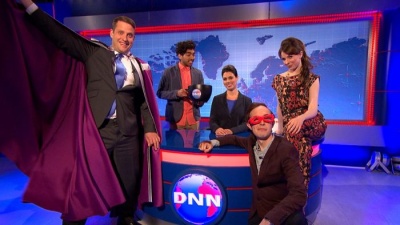 The cast of DNN, with Cariad Lloyd on the right, Mawaan Rizman second left, and other great comedians.
The cast of DNN, with Cariad Lloyd on the right, Mawaan Rizman second left, and other great comedians.
Translation is a game of vocal perception and intonation. Cariad delivers a lecture in fluent Gibberish, translated into English by Steen's fluency in Gibberish. Never gets off the starting block, this round, and we're not sure there's much idea. Drama next, as they try to win all of the awards in all of the categories in one single piece of drama.
The final round is the tale of Caesar and the Salad, with a noise for each participant to take over the story. Fail to take over the story at the right point – even down to the syllable – is an elimination offence. Last player standing wins some points. At the end of the show, Mike awards some arbitrary points and declares a winner.
Improvisation comedy is easy to do on radio, where we have to concentrate on the words. There are plenty of antecedents – we've spotted a round liberated from I'm Sorry I Haven't a Clue, where there are many more abandoned rounds ripe for the plucking (we say, from the Good News Bad News fan club). The show's speed owes a lot to Whose Line is it Anyway? – lest we forget, Clive Anderson's show started on Radio 4 before jumping to commercial telly.
Wing It was a curate's egg – some of the bits worked, some of them jarred quite badly. Some went on too long, some were truncated before they really got going. We can forgive that because pilots are never quite the finished product. Would we commission a full series, if we were Radio 4 controller? There's enough here to say yes, pop it out in the late evening comedy spot and see how much of an audience it gets.
Unspeakable
Brown Bread for Radio 4, 18 February
Phil Wang hosts, with Susie Dent. Phil describes Susie as "the Gandalf of the dictionary", and this gives a rather long digression into Tolkein and all that. Maisie Adam, Stephen Fry, and Laura Smith are on the panel for this episode.
The basic thought behind the show is crisp enough. Each of the three guests has come with a new word of their own invention, to describe an experience / emotion / object / sensation that doesn't currently have a name in English. It's useful for those times when we're literally lost for words. Susie gives an example: the neighbour who always puts their refuse out first – they're a binfluencer.
"Maisie, you're bilingual, you speak English and Northern." Ooh, feel the soft southerner with his hands full of them frothy coffees. Laura used to be an English teacher, and Stephen Fry is occasionally known for his ability to use English in a reasonably precise way. Best word is added to the Unspeakable Dictionary, and wins its proposer the Unspeakable bookmark.
Maisie starts us off. Eplotulation – when one realises one has worked out the ending of a work. "I was watching Gigglebiz when my son eplotulated – he knew Rapids Johnson would end up missing the bear." Susie has a similar word, Explatorate – to waffle on continuously in a way designed to avoid answering a question, something Rapids' useless brother knows about. The panel discuss this concept, and whether it's worth including in the dictionary.
Stephen Fry has the next concept. Shiffle – when you look at a magazine, find an interesting article, show it to your husband, but cannot find it again. These days, it's also when you've seen a fascinating post on social media, gave it a favourite and a bookmark, but cannot find it again.
Susie has similar ideas – to shiffle-shaffle, walk in an unsteady and shambling manner. She also reminds us that Stephen was the first person to write down luvvie for a theatre actor.
New words for existing concepts is a well-trodden idea. Back in the 1980s, comedy series Not the Nine O'Clock News travelled to America, where it went out monthly as Not Necessarily the News. One regular feature was "Sniglets", a humorous word to describe something for which no dictionary word exists. Rich Hall read out ideas like rovalert (how one dog barking can spark off all the pets in the neighbourhood), and got ideas from the viewers at home.
Rich Hall never got to remove words from the dictionary. Stephen Fry wishes to banish iconic, which has lost all impact and now means "moderately well-known" – Susie calls this process "semantic bleaching". Laura will get rid of journey where nobody physically moved, such as her recent trip on the Central Line. Maisie will ditch hivemind, as in "Hivemind, what are the best running shoes?"
Laura proposes her new word. Chups, any salty and crunchy snack, like peanuts and Twiglets. "Are you serving food? No, just chups." Distinct from the existing crisps, and similar in meaning to the Malay word krupuk. Monster Munch and popcorn are in, olives are out, dried mango isn't salty enough.
Susie tells us that "chups" is already in the dictionary: the sound you make when sucking air through the teeth, or an unsatisfactory and perfunctory kiss.
There is an audience in the studio, so the decision is made by host Phil Wang. He's decided to put in Stephen's shiffle, and that means he wins the star prize. It's congritulations from the others: well done through gritted teeth. To fill out the programme, they have a few more neologisms from the audience.
We like the basic idea of Unspeakable, it's modern and gently educating and warm and witty. Any show with Susie Dent is going to be worth a listen. But these new words aren't enough to fill a whole show, and they had to pad to fill out the pilot. Creator Jo Varley has a good idea, perhaps an extra round (guess the definition of someone else's word?) would help to make the programme feel fuller.
If this column were controller of Radio 4, we would pay for another pilot episode in a few months. Or we'd ask for it to be reformatted to a 23-minute spot, perfect to go out at 8.35am once we've chopped The Today Show down to size.
One Person Found This Helpful
Pozzitive for Radio 4, from 19 February
So far, we've reviewed two pilots that went out on Sunday evenings – it's a secluded slot for people who have chosen to listen to Radio 4, almost the whole country will be watching telly at that time. One Person Found This Helpful went straight into the high-profile Monday 6.30 slot, where we'd usually find Just a Minute and I'm Sorry I Haven't a Clue. Straight away, our expectation went up about 200%: this show has to land, and it has to land quickly.
Frank Skinner is the host, and he tells us it's a show about online reviews. So, this is an online review about a show about online reviews. And, if you're reading this on the Sunday lunchtime as we publish, you can listen to the show we give an online review to as we review online a show about online reviews.
Our sample episode features Laura Smith and Marcus Brigstocke, Sara Barron and Pierre Novelli. And we begin by asking the panel: what's the best (or worst) review you've ever had. Pierre recalls being hired to do a private gig for all of the best bus drivers in Wiltshire, which is an idea so bizarre it would be his Only Connect introduction fact.
What did I buy? is the first round. Two reviews for each team, which hopefully will clue in to what they're describing. Marcus wonders if it's a Depilatory Wax – three more from their session later on the John Peel show. Sara and Pierre take forever to come up with the idea of a lava lamp. "Well, that was stressful," says Frank. One way to put it, "painful" another.
The reviewee bites back: what happens when the business you're reviewing has a go in response. We hear a real review, then the teams snipe back at the person who left it. Frank gives the actual reply, which may or may not be funnier than the comedians' efforts.
And that's a major problem with One Person Found This Helpful. It doesn't really know if it's a quiz with proper answers, or if it's an improvisation comedy show. One Person Found This Helpful seems to want to ridicule the cult of online reviews, but doesn't have the gumption to actually go through with its desire. Pick a side and go with it! This column would prefer a comedy skewering, but we can imagine that a sincere quiz could be interesting.
They've taken up almost half the show on this responses round, so we need to move quickly on with Where on Earth are we? It's good to travel, it's even better to avoid the Clacket Lane service station. Two reviews of a tourist attraction, but which one is it? What attraction was closed because it was freezing, leading to a massive rant by some far-right nutter?
And that's the end of the show. Scores are totted up, a winner is declared. And we ask ourselves: is that it? You got five comedians in the room and this is all you can give us? A comedy show that is more laboured than Hercules' week, nothing like as funny as it ought to be? We've sat through three episodes of One Person Found This Helpful, and call "enough". The show was devised by Simon Evans and Jason Hazeley with the producer Jamie Tyler. It lists about half-a-dozen writers, and sounds like it's been written by a committee.
There's the germ of a great idea here: online reviews are a familiar phenomenon, they're ripe to be satirised, have the pomposity pricked till they collapse in a bubble. But this show doesn't cut the mustard for us. It's more irritating than entertaining. Too slow to get to any point and the diversions are more dull than we'd like.
If we're Radio 4 controller, we're passing on the programme. Not that it is without merit, just that it's not a Radio 4 programme. We will offer it to Radio 2, who seem to have a thing for ill-considered rants, particularly for those two hours at midday.
Counterpoint
The longest-running music quiz on the radio isn't Ten to the Top. It's not even that upstart Popmaster. No, it's Radio 4's Counterpoint, which first aired in July 1986. Always played by three contestants, this week's finalists are
- James Bingham from Stockport and Wicklow
- Annie Hodkinson from Kingswinford
- Anju Shada from Hertfordshire
Over the years, Counterpoint has gently evolved – it's no longer a classical quiz with a few pop questions bolted on, Counterpoint is a quiz about all forms of music. Stephen Garner writes the scripts, with additional questions from Alyssa Mattinson and Lilian Crawford. Evolution is imperceptible from one series to the next, but there's a clear difference between this year's series and the 2012 run that went out on 4xtra earlier in the year.
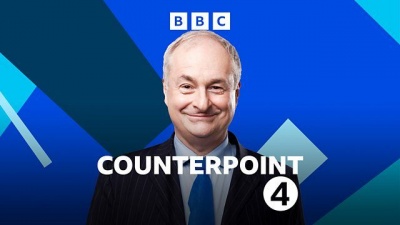 Paul Gambaccini has hosted for over 15 years.
Paul Gambaccini has hosted for over 15 years.
The first round asks after the Young One who now appears in Chicago, the song "Abraham, Martin, and John" (and Bobby Kennedy), the recent Barbie film soundtrack, and the most unexpected conga since the last Top of the Pops reruns. Questions are in rotation, and errors are offered for bonuses. After four questions and some bonuses each, James has 3, Anju's got 7, Annie has 9.
Five specialist subjects are sprung on the contestants. Nobody picks "Beethoven's people and places" or "Tim Rice and his Amazing Technicolor Collaborations", so they'll go back in the pool for next series. James chooses the "Life of Leonard Bernstein", which includes a remarkable jazz piece ending with three men calling "New York!" in close harmony. It's from On the Town, and helps James answer five of the seven questions correctly. Ten points!
Anju has picked "Pop on the London Underground", and identifies Raph Ravenscroft as the saxophonist on the song "Baker Street". A few delays to the scores, so Anju only picks up six points. Annie was in the lead after the first round, so got first choice of the subjects, and picked "Streisand at the Movies". Lots of questions about Barbra S, from "Yentl" through Fanny Brice and "A Star is Born" to "Hello, Dolly". Another successful round nets ten points!
James and Anju have 13 points each, Annie's in the lead on 19. But it can all change in the quickfire buzzer round, one point for a correct answer, one away for an error, there are no bonuses. And we'd really love for these buzzers to actually go "buzz", because it's weird when Paul Gambaccini suddenly grinds to a halt: has our podcast busted again. Anju is buzzing quickly and accurately, Annie buzzes more cautiously, and James comes in often but not always well.
Lots of questions in this quickfire round, and we cannot possibly keep up with the scores. Just appreciate the editing, with the final answer "The winner takes it all". In the final, Anju has 17 marks, James has 18, and Annie Hodkinson wins with 21.
So Annie Hodkinson becomes the 37th holder of the Counterpoint silver trophy. Well done to her, well done to all who took part in a fun series. It'll be back next year, otherwise we will storm the Controller's office to sing at him.
In other news
Tony Green has died. The scorer on Bullseye, foil to Jim Bowen's comedy seeds, and always reminded contestants to "take your time". He was also the BBC's resident darts commentator from 1978 until 2016, sharing the honours with Sid Waddell until 1994. We last heard him on Let's Play Darts for Comic Relief about a decade ago. After a long fight with Alzheimer's, Tony died aged 85.
The Royal Television Society awards nominations list is out. Thirty categories for their awards at the end of the month, three nominees in each category. Game shows and folk up for awards are:
- Comedy Entertainment – Taskmaster
- Daytime Programme – Junior Bake Off
- Entertainment – The Wheel, Squid Game The Challenge, Strictly Come Dancing
- Entertainment Performance – Hannah Waddingham for Eurovision Song Contest, Noel Fielding and Alison Hammond for Bake Off
- Formatted Popular Factual – The Piano
- Live Event – Eurovision Song Contest
An apology would be nice, if you mean it Last November, Christ Church Oxford played their second-round match on University Challenge. During this show, which was recorded last spring, one of the team wore clothes in black, green, and a brown that might look like red if your telly is set up badly. The college mascot was a stuffed octopus.
Jacqueline Foster put two and two and two together and got sixty squillion. Ms. Foster asserted, without any proof, that the Christ Church team in general, and student-star Melika Gorgianeh in particular, were somehow advocating an antisemitic position and publishing their views about in the war in Gaza. Never mind that the war didn't begin until months after UC was recorded, or that she's blithering on about a toy octopus. It really is most tiresome: can't these people concentrate their efforts on something that actually makes a difference to people's lives?
Anyway, Jacqueline Foster, a politician who identifies as "Baroness Foster of Oxton DBE", published those ill-considered remarks on antisocial media. She has since apologised as "these allegations were completely false and unfounded", and made an out-of-court settlement with Ms Gorgianeh and her representatives Rahman Lowe Solicitors. Let this be the last we speak of this utter foolishness.
Quizzy Mondays
Christ Church Oxford were on this week's University Challenge, playing Open in the second elimination match. It wasn't a classic, we saw seven dropped starters and three missignal penalties before the music bonuses, at which point the score was 55-55. Mercifully, things picked up in the closing ten minutes, four successful buzzes from Arthur Wotton pushed the lead over 80 points, and a bit of a run in the closing minute saw the Oxford side win 170-75. Rajan was right to cheer Open's pleasant applause for great buzzes by their opposition: more of this, please.
Earlier, on Mastermind, Oli Hanson knew a marathon and a sprint – his specialist round was on the world championships run by Sebastian Coe's World Athletics organisation. Slow and steady earned a perfect round, and another good general knowledge secured the win.
Of the others, Tom Adlam stumbled on a set of questions written by someone who'd never watched Breaking Bad before. Lisa Cowan was flummoxed by a tricky first question – a swerve that appeared to be asking for "superior" but ended seeking the opposite of "junior"; poor question editing, if you ask us. Julie Ashcroft also struggled, on Mary Shelley, though we would love to see the Harlem Globetrotters play against the NBA stars.
Sunday has the finals of The Great Pottery Throw Down (C4) and Dancing on Ice (VM1 and ITV). Monday brings us Bridge of Lies (BBC1, all week) and Round the Islands Quiz (Radio 4) with – lummee! – top improviser Cariad Lloyd. On Tuesday, Interior Design Masters has Alan Carr in unexpected places (BBC1), and Mel Giedroyc is Unforgivable (Dave). Live sportsball next Saturday means there's no Gladiators or Saturday Night Takeaway.
And be creative, support each other, and enjoy your radio stuff!
Picture credits: BBC Studios, Brown Bread, Whisper North, Pozzitive, Paul Gillett (CC-BY-SA), Central.
To have Weaver's Week emailed to you on publication day, receive our exclusive TV roundup of the game shows in the week ahead, and chat to other ukgameshows.com readers, sign up to our Google Group.

